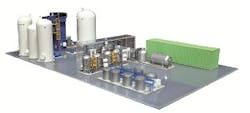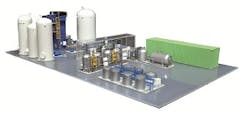Desalination trials in UAE show 7% energy saving on Masdar target
Early results have been released from advanced trials designed to bring down energy usage and couple desalination and renewable technologies.
Veolia, through its desalination specialist SIDEM, has been collaborating on Masdar’s Renewable Energy Water Desalination Program (read WWi article) in the United Arab Emirates.
The pilot plant, built in the Ghantoot area, has been producing potable water since August, abiding by the same operation constraints as a large plant and capable of handling very harsh seawater conditions (salinity up to 52 g/l, temperature which may exceed 42°C and harmful algal blooms).
Veolia said the trial has demonstrated electrical consumption performances by 7% compared to the contractual target initially required by Masdar.
These energy cost savings can be added to those generated by a new pre-treatment design which can save 25% on civil works and, therefore, reduce the footprint of the plant as well as its CAPEX, the company said.
Technologies used in the trial include high performance seawater pre-treatment, combining air floatation and filtration, as well as a new osmosis membrane feed configuration able to deal with high treatment fluxes. A Swiss company which Veolia has been partnering with has also been developing new Energy Recovery Devices (ERD) which are implemented on the pilot.
In a press release, Veolia said: “Although these are all new technologies, their development is advanced enough to consider them ready for large-scale implementation. The upcoming optimisation phase will allow Veolia experts to push the limits of their system in order to further enhance the design and processes, in the pursuit of even better power efficiency while extending the lifetime of the plant.”
###
Read more
Scaling up the Middle East’s Renewable Desalination
Large scale solar desalination race continues in the Middle East

